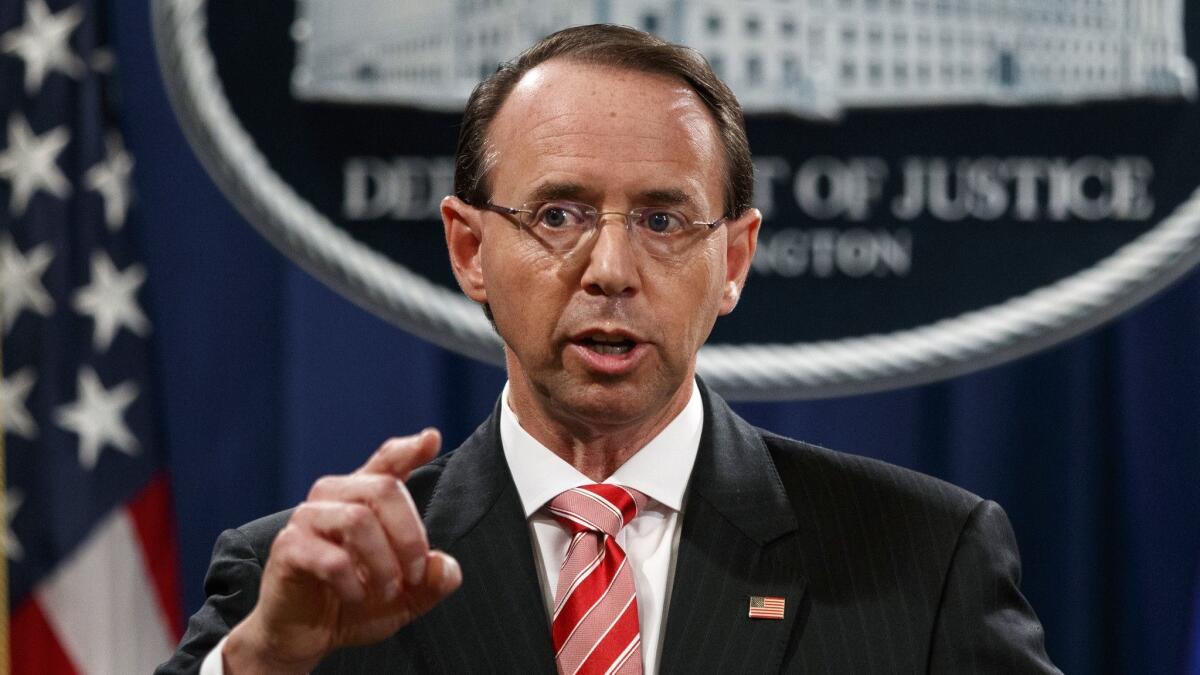Editorial: Hands off Rod Rosenstein

- Share via
Three days after he reportedly went to the White House to turn in his resignation, Deputy Atty. Gen. Rod Rosenstein is finally set to meet with President Trump on Thursday to discuss his continued employment. The right course for Trump is clear: He should tell Rosenstein to remain on the job.
This might seem like counterintuitive advice. Rosenstein is probably the president’s second least favorite appointee at Justice — the least favorite being Atty. Gen. Jeff Sessions, who enraged Trump when he took the ethically imperative step of recusing himself from any investigation related to the 2016 presidential campaign, which he served as a Trump adviser.
That set the stage for Rosenstein to take charge and name Robert S. Mueller III as a special counsel to investigate possible coordination between Russia and the Trump campaign, an inquiry Trump has denounced as a “rigged witch hunt” even as Mueller has scored a string of guilty pleas and the conviction of Trump’s former campaign chairman.
Rosenstein’s departure would clear the way for Trump to install a more pliable acting attorney general to supervise — or possibly subvert — Mueller’s investigation. So far, though, Trump has stayed his hand, possibly because removing Rosenstein would be viewed as a transparent attempt to obstruct justice by a president who has not only sought to discredit Mueller, but has threatened to “get involved” in the Justice Department’s operations.
Enter the Fray: First takes on the news of the minute from L.A. Times Opinion »
Circumstances changed dramatically last week, however. The New York Times reported that shortly after assuming his post last year, the deputy attorney general suggested that he secretly record Trump and discussed recruiting Cabinet members to invoke the 25th Amendment to remove the president. Rosenstein called the story “inaccurate and factually incorrect.” Even so, alleged insubordination could give Trump a plausible pretext for getting rid of Rosenstein.
That would be a disaster for the Mueller investigation and the Justice Department. Rosenstein isn’t just Mueller’s protector; he has become a symbol of continuity and institutional integrity at Justice. Those qualities make it imperative that Rosenstein, an experienced prosecutor, remain on the job, despite this latest controversy.
It’s conceivable that the Mueller investigation could proceed unimpeded under the direction of another official. (The White House has suggested that if Rosenstein were to leave, Solicitor General Noel Francisco would assume that role, although there is some question about whether he would face a conflict because his former law firm represents the Trump campaign.) But even in the most optimistic scenario Rosenstein’s departure would be a disaster. Ominously, one of Trump’s personal attorneys suggested Monday that if the deputy attorney general resigned, there should be a “time out on this inquiry.” This is precisely the kind of outcome we should both fear and expect if Rosenstein is successfully pushed out of the way.
Keeping Rosenstein on the job would be good for the country, but (as the president himself might ask), what’s in it for Trump? Simply this: Rosenstein’s departure would be widely viewed — including by many voters in the midterm elections — as a blow to the impartial administration of justice and the principle that the president is not above the law.
Follow the Opinion section on Twitter @latimesopinionand Facebook
More to Read
A cure for the common opinion
Get thought-provoking perspectives with our weekly newsletter.
You may occasionally receive promotional content from the Los Angeles Times.










